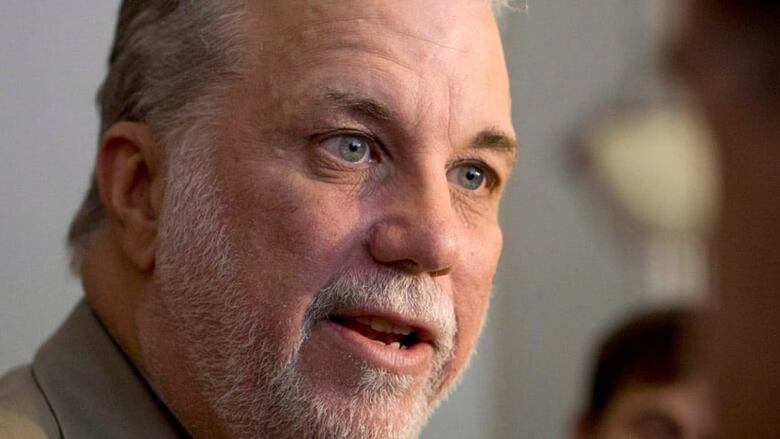Philippe Couillard says Parti Québécois 'indifferent' about Anglos
Pauline Marois says the Parti Québécois has always been respectful of anglophones

Quebec Liberal Leader Philippe Couillard said the Parti Québécois has "no empathy" for English-speaking Quebecers and their views on the current political situation, in light of a new CBC-EKOS poll.
- CBC Special Report: Stay or Go poll numbers
- Stay or Go series
- Editor's Blog: A surprising poll in Quebec
Couillard's statement was in response to new poll results released Monday which suggest nearly one Quebecer out of two believes the PQ government is actively trying to discourage non-francophones from staying in the province.
Forty-six per cent of respondents said they agree with that statement, the CBC-commissioned poll found.
That percentage is significantly higher in groups representing the province’s minorities.
"[The PQ is] totally indifferent to how our fellow English-speaking Quebecers feel about the situation. This is something that is deplorable," Couillard told reporters on Monday.
"There is no preoccupation for how our English-speaking fellow Quebecers ... view the current policies and the direction that is being taken by the PQ."
The vast majority of anglophones surveyed in the poll — 81 per cent — said they agree that the PQ is actively trying to discourage non-francophones from staying. Seventy-eight per cent of allophones surveyed also agreed.
Visible minorities were significantly more likely to agree than those who identified as Caucasian, 61 per cent to 44 per cent respectively.
Marois has 'great respect' for Anglos
Premier Pauline Marois defended her party, saying they have always been respectful of the anglophone population.
"I have great respect for the Anglo-Quebecers. This community is important in my perspective," said Marois.
"I have always had a great respect for this community and I will continue to as leader of the government."
'A strategy pursued actively at the top-ranks'
Yaffa Tegegne, executive director at Canadian Rights in Quebec (CRITIQ), said CRITIQ often receives calls from anglophones who say they feel frustrated because their rights are not being respected.

''I think a lot of people — especially the ones who have been here since the 1970s — feel that this is a strategy that is being pursued actively at the top-ranks,” said Yaffa Tegegne, executive director at Canadian Rights in Quebec (CRITIQ).
Tegegne says the strategies are working.
''On the one hand, Pauline Marois commented that the English community is important to her. On the other hand, she promotes policies that are obviously alienating the English community and the minority communities," said Tegegne.
"It's very unfortunate that she doesn't see the English community as a benefit to the future of Montreal and the future of Quebec."
Secular charter divide
The provincial government’s secular charter has drawn sharp criticism from minority groups, including the Muslim Council of Montreal, who say the proposed legislation betrays minorities.
Bill 60, or the secular charter, would prohibit the wearing of overt religious symbols in the public service.
The PQ government has defended the bill as something that would unite Quebecers under one "national identity."
“Not everyone thinks the same way, and the way they think about leaving Quebec depends on their experience in Quebec. I think the experience we are having makes it very legitimate,” said Sylvia Martin-Laforge, director general at the Quebec Community Groups Network (QCGN).
About the survey
A total of 2,020 Quebec residents were interviewed by phone between Feb. 10 and 18, 2014, as part of this CBC-commissioned Ekos study. The margin of error for a sample of 2,020 is plus or minus 2.2 percentage points, 19 times out of 20.
Those surveyed included 782 anglophones (with a margin of error of plus or minus 3.5 percentage points 95 per cent of the time), 1,009 francophones (with a margin of error of plus or minus 3.1 percentage points 95 per cent of the time) and 223 allophones (with a margin of error of plus or minus 6.5 percentage points 95 per cent of the time).
Anglophones are respondents who identified their mother tongue as English; francophones are people who identified their mother tongue as French; and allophones identified their mother tongue as "other."
Percentages for total respondents have been weighted to reflect linguistic population make-up of Quebec.